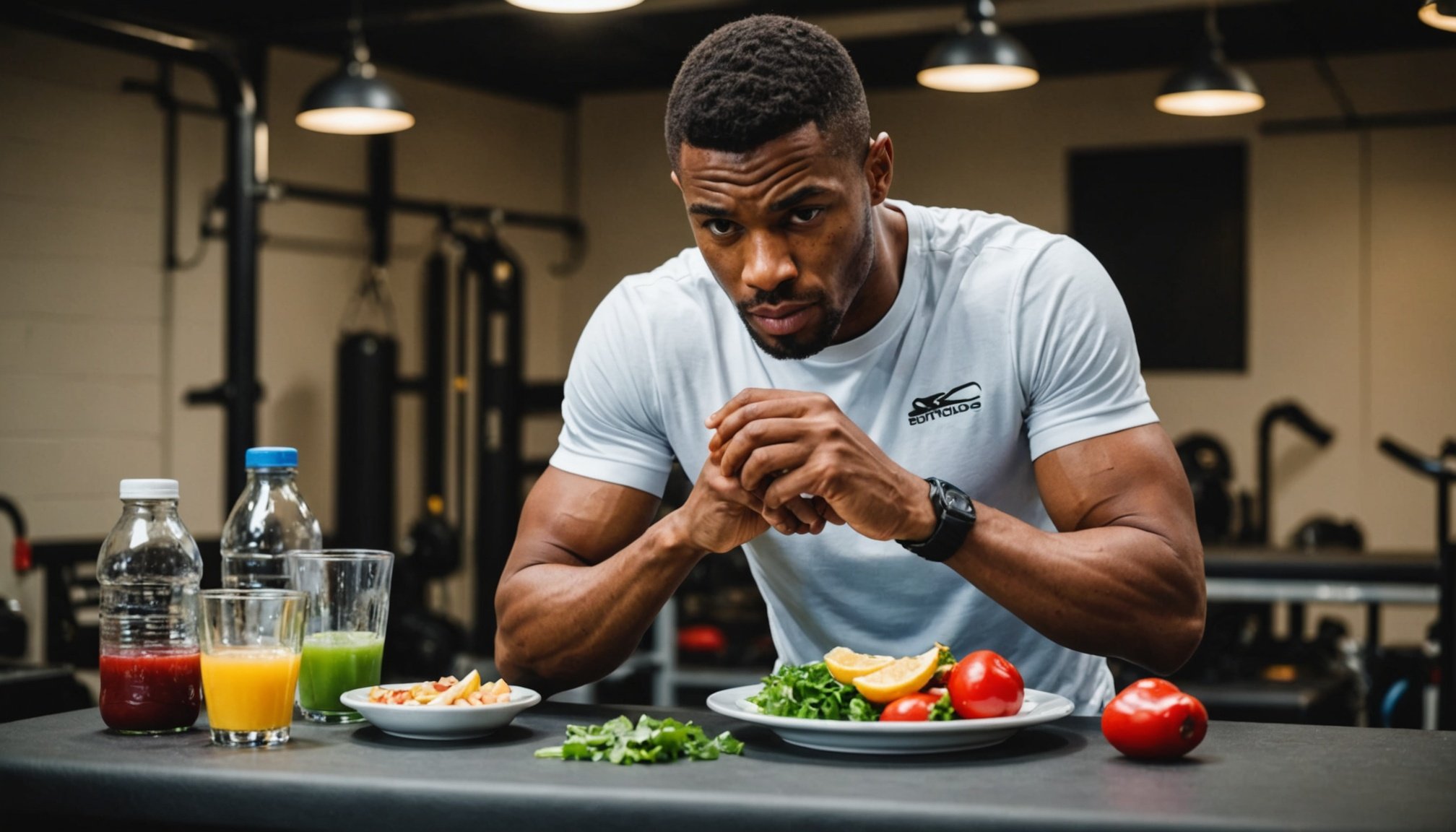Ultimate Guide to Off-Season Nutrition: Key Dietary Tips for UK Boxers
Understanding the Importance of Nutrition in Boxing
When it comes to boxing, nutrition is just as crucial as the training itself. A well-planned diet can make the difference between a boxer who performs at their best and one who struggles to keep up. During the off-season, maintaining a balanced and tailored nutrition plan is essential for boxers to ensure they are in optimal shape for the next fight.
Setting Your Nutritional Goals
Before diving into the specifics of a boxing diet, it’s important to define your nutritional goals. Here are a few key objectives:
In parallel : How can martial artists effectively transition between different fighting styles?
Weight Management
For boxers, managing body weight is critical. This involves either maintaining, gaining, or losing weight, depending on the fighter’s needs and the upcoming competition. A boxer aiming to lose weight must do so in a healthy manner to avoid compromising their performance and overall health.
Muscle Mass and Strength
Building and maintaining muscle mass is vital for athletic performance. Protein intake plays a crucial role here, as it helps in muscle repair and growth.
Additional reading : Unlocking the Power of Yoga: How UK MMA Fighters Can Enhance Their Training Routine
Energy Levels
Boxing is a high-intensity sport that requires sustained energy levels. The right balance of carbohydrates, proteins, and healthy fats ensures that a boxer has the energy needed for intense training sessions.
The Balanced Boxing Diet
A balanced diet for a boxer should include a variety of foods from all nutritional groups.
Proteins
Protein is essential for muscle repair and growth. Here are some high-protein foods that should be part of a boxer’s diet:
- Lean Meats: Chicken, turkey, and lean beef.
- Fish: Salmon, tuna, and cod.
- Eggs: Rich in protein and other essential nutrients.
- Legumes: Beans, lentils, and chickpeas.
- Dairy: Low-fat milk, yogurt, and cheese.
- Plant-Based Options: Tofu, tempeh, and seitan.
| Food | Protein Content (per serving) |
|
|-------------------------------|
| Chicken Breast| 30-35 grams |
| Salmon | 20-25 grams |
| Eggs | 6-7 grams per egg |
| Lentils | 18 grams per cup |
| Greek Yogurt | 20 grams per cup |
Carbohydrates
Carbs are the primary source of energy for boxers. Here are some complex and simple carbs that should be included:
- Complex Carbs: Whole grains like brown rice, quinoa, and whole wheat bread.
- Simple Carbs: Fruits, vegetables, and some dairy products.
| Food | Carbohydrate Content (per serving) |
|
|--------------------------------------|
| Brown Rice | 45 grams per cup |
| Quinoa | 30 grams per cup |
| Apple | 25 grams per medium-sized fruit |
Healthy Fats
Healthy fats are crucial for hormone production and overall health.
- Avocado: Rich in healthy fats and fiber.
- Nuts and Seeds: Almonds, walnuts, chia seeds, and flax seeds.
- Fatty Fish: Salmon and tuna.
| Food | Fat Content (per serving) |
|
|--------------------------------------|
| Avocado | 10 grams per medium-sized fruit |
| Almonds | 14 grams per ounce |
| Salmon | 12 grams per 3-ounce serving |
Meal Planning for Boxers
Meal planning is essential to ensure that a boxer is getting the right nutrients at the right time.
Sample Meal Plan
Here’s a sample meal plan for a typical day:
Breakfast
- Oatmeal with fruits and nuts
- 300 calories, 30g carbs, 20g protein, 10g fats
Mid-Morning Snack
- Greek yogurt with berries and honey
- 200 calories, 30g carbs, 20g protein, 0g fats
Lunch
- Grilled chicken breast with brown rice and vegetables
- 500 calories, 60g carbs, 40g protein, 10g fats
Pre-Training Snack
- Banana with almond butter
- 200 calories, 30g carbs, 8g protein, 16g fats
Post-Training Meal
- Lean beef with quinoa and mixed vegetables
- 600 calories, 60g carbs, 50g protein, 20g fats
Dinner
- Baked salmon with sweet potatoes and green beans
- 500 calories, 60g carbs, 40g protein, 20g fats
Hydration and Supplements
Hydration
Staying hydrated is crucial for performance and recovery. Aim to drink at least 8-10 glasses of water per day.
Supplements
While a balanced diet should be the primary source of nutrients, some supplements can be beneficial:
- Protein Shakes: Useful for post-workout recovery and muscle growth.
- Creatine: Helps in increasing muscle strength and endurance.
- Multivitamins: Ensures that all essential vitamins and minerals are covered.
Training and Nutrition Timing
Timing your meals in relation to your training sessions is vital.
Pre-Training Meal
Eat a balanced meal about 2-3 hours before training. This should include complex carbs, proteins, and healthy fats.
Post-Training Meal
Consume a meal rich in proteins and complex carbs within 30-60 minutes after training to aid in recovery.
Common Mistakes to Avoid
Here are some common nutritional mistakes that boxers should avoid:
- Inadequate Hydration: Not drinking enough water can lead to decreased performance and increased risk of injury.
- Poor Meal Timing: Eating too close to training or not eating enough after training can hinder performance and recovery.
- Consuming Bad Fats: Foods high in bad fats can lead to weight gain and decreased athletic performance.
- Ignoring Vitamins and Minerals: These are essential for overall health and performance.
Example of a Successful Boxing Diet Plan
Let’s take the example of a professional boxer preparing for a fight:
| Day | Calories | Carbs | Protein | Fats |
|
|----------|
|---------|
|
| Monday | 2500 | 300g | 150g | 70g |
| Tuesday | 2500 | 300g | 150g | 70g |
| Wednesday | 2200 | 250g | 120g | 60g |
| Thursday | 2500 | 300g | 150g | 70g |
| Friday | 2200 | 250g | 120g | 60g |
| Saturday | 2000 | 200g | 100g | 50g |
| Sunday | 2000 | 200g | 100g | 50g |
Quotes from Experts
- “Nutrition is the foundation of any successful training program. Without the right fuel, you can’t perform at your best,” says Enoch Effah, a triple world champion in boxing[4].
- “A balanced diet that includes proteins, complex carbs, and healthy fats is essential for maintaining muscle mass and energy levels,” advises Bérengère Philippon, a nutrition coach[4].
Nutrition is a critical component of a boxer’s training regimen. By understanding the importance of proteins, complex carbs, healthy fats, and proper hydration, boxers can optimize their performance and recovery. Avoiding common mistakes and timing meals correctly can further enhance their athletic performance. Whether you’re a professional boxer or an amateur, a well-planned diet is the key to achieving your goals in the ring.
Practical Tips for Boxers
- Eat Regular Meals: Divide your daily calorie intake into 5-6 meals to maintain stable energy levels.
- Choose Whole Foods: Focus on whole, unprocessed foods like fruits, vegetables, lean meats, and whole grains.
- Stay Hydrated: Drink water regularly throughout the day, especially before and after training sessions.
- Consult a Nutritionist: If possible, work with a sports nutritionist to tailor a diet plan specific to your needs and goals.
By following these guidelines and tips, boxers can ensure they are fueling their bodies for optimal performance, both in and out of the ring.










